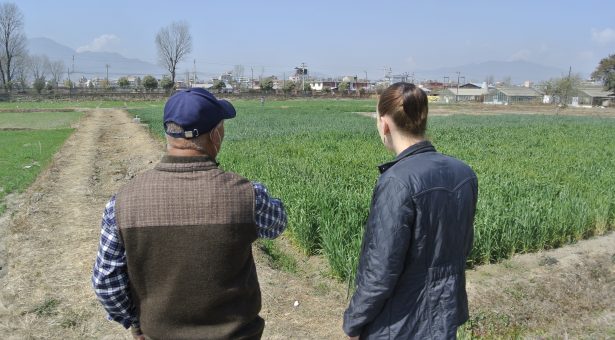
Recent discovery of the Ug99 wheat stem rust strain in Nepal has once again emphasised the need for vigilance to protect Nepal's third most important food crop from any large-scale outbreaks of this devastating wheat disease.
Nepal already contends with frequent large-scale outbreaks caused by the related yellow rust pathogen, that can cause severe grain yield losses of 30 – 80% if not effectively controlled. A key component in guiding the correct control measures is to understand the precise strain of the pathogen present in a farmer's field.
For yellow rust, the deployment of MARPLE diagnostics in Nepal since 2022 has helped provide this capacity. The MARPLE diagnostics methodology developed at the John Innes Centre in collaboration with CIMMYT, uses a handheld MinION nanopore sequencer, built by Oxford Nanopore, to analyse samples of wheat infected with yellow rust. Reading the pieces of the pathogen's genome which define the different strains of the wheat rust pathogen, this method can provide near real-time information about which strains are present in a region.
This mobile genotyping approach enables the identification of individual strains of the pathogen rapidly in situ, without the need for high-tech facilities. It can also provide strain-level information within 48 hours of collecting samples, making it ideal for responding to disease emergencies.
Through support from the USAID-funded Feed the Future Innovation Lab for Current and Emerging Threats to Crops, led by Penn State University, the team at JIC has also recently expanded this method so it can be used to identify and track strains of the stem rust pathogen. The recent deployment of this method in Nepal, will ensure strains such as Ug99 can be effectively monitored in near real-time.
Suraj Baidya, senior scientist and chief of the National Plant Pathology Research Centre at NARC where MARPLE diagnostics has been adopted, noted: "It is fantastic to have this capacity available at our research station. MARPLE diagnostics is giving us the rapid diagnostics needed to help identify and manage changes in the rust pathogen population diversity."
Successful trials of the stem rust MARPLE platform were completed at NARC by Dr Ram Khadka in July 2024, with support from CIMMYT and the John Innes Centre. Samples from Khumaltar were successfully identified as Clade IV, another new stem rust strain in Nepal, matching results obtained at the Global Rust Reference Centre in Denmark. Dr Ram Khadka commented: "This represents the first application of MARPLE to stem rust in South Asia and provides a useful new tool for rapid diagnostics on this latest threat to wheat production in Nepal."
Professor Diane Saunders, project co-lead and group leader at the John Innes Centre, commented: "Given the recent shifts in the stem rust population in Nepal, it is vital that this capacity is available to our colleagues in Nepal. We are providing them with access to the latest innovations in plant disease diagnostics where it is needed most, in the hands of researchers in the field who are working tirelessly to combat these devastating diseases."
Professor David Hughes, Director of the Feed the Future Innovation Lab for Current and Emerging Threats to Crops commented: "This is an incredibly exciting demonstration of the potential of what happens when we focus on building capacity at the national level. With excellent and rapid genetic tests such as MARPLE that can build on the PlantVillage platform with its phenotypic diagnostics via AI we can get to the situation of rapid Surveillance which enables Solutions to be deployed."
Dr Dave Hodson, project co-lead, said: "In the months ahead MARPLE diagnostics will be used to monitor any spread of the Ug99 strain and rapidly identify any other notable strains to help combat the ever-evolving threat of the wheat rusts in Nepal."
MARPLE diagnostics is currently supported by the Bill & Melinda Gates Foundation and the Foreign, Commonwealth and Development Office (UK), with additional support from the Feed the Future Innovation Lab for Current and Emerging Threats to Crops funded by the United States Agency for International Development (USAID), the UK Biotechnology and Biological Sciences Research Council (BBSRC) Innovator of the Year Award, and the CGIAR Big Data Platform Inspire Challenge.






